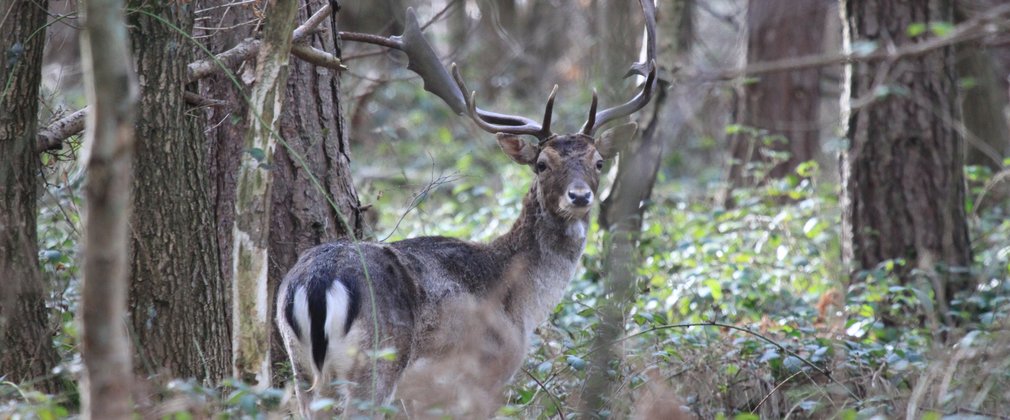
Managing deer in the nation's forests
The UK is home to six species of deer. These include red deer and roe deer, which are native, and four introduced species: fallow, muntjac, sika and Chinese water deer.
Natural predators of deer, such as bears, lynx and wolves, are now extinct in Britain. Within properly functioning ecosystems, deer play an important role by maintaining open areas which can enhance the biodiversity and habitat quality of a woodland. However, without any predators, large deer populations can have a devastating effect on their environment.
Impact of overpopulation
Deer numbers can become too large for their habitat to support them. Grazing by large populations of deer reduces plants and animal diversity in the forest which can in turn affect soils and release carbon. Deer can also damage or kill young trees by damaging bark and lower branches, preventing forests from regenerating.
Research by the British Trust for Ornithology has found that common species including robin, wren and blackbird are less likely to be in woodland areas browsed by deer. Some of our most vulnerable breeds, such as nightingale, nightjar and woodcock, are also negatively affected by deer grazing and browsing.
Without predators, deer are more likely to suffer from starvation and sickness.
How we control deer numbers
Over the last few decades all six deer species have increased dramatically in range and number, and deer populations are now higher and more concentrated across England than they have ever been.
Forestry England is part of the Deer Initiative, a partnership that promotes sustainable management of wild deer in England and Wales.
We manage deer populations in order to look after our forests sustainably. Our highly skilled wildlife rangers replace the role of Britain’s missing predators by sensitively and humanely controlling deer populations in woods. Our expert staff use trained working dogs to track and find deer.
Our rangers work to the highest standards of safety and animal welfare. We use lead-free ammunition, and were one of the first organisations in the UK to do so. Each deer is inspected, uniquely tagged, processed and stored according to food hygiene standards.
Wild venison
Our main objective is always forest management, rather than wild meat production, but having a reliable and ethical outlet for this by-product is important to make best use of what would otherwise go to waste.
The meat supplied to our partner game dealers is turned into a range of cuts of wild venison that is sold across the country.
You can buy our wild venison online at Farm Wilder.
Through our partnership with Highland Game and East Lancashire Hospital Trust, Forestry England venison is being supplied to hospitals across East Lancashire. From April 2021 to April 2022 we provided 1000kg of wild venison, which has enabled nutritious and popular meals to be created for patients and staff. You can read more about the partnership and the healthy meals venison from the nation's forests is providing.
Forestry England are proud to be part of the working group which has developed the British Quality Wild Venison Standard which was launched in April 2023. The Standard aims to guarantee traceability of wild venison and ensure a set of standards are met throughout the supply chain. To be awarded the British Quality Wild Venison Standard applicants must demonstrate compliance with the relevant regulations and Best Practice while ensuring traceability of the venison.
We are pleased to have been awarded the British Quality Wild Venison standard in 2024, reflecting our high standards in managing deer and producing wild venison from the nation’s forests.
For more information on the British Quality Wild Venison Standard visit www.growninbritain.org/british-quality-wild-venison

